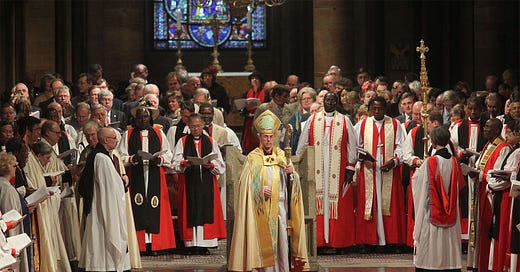Nationalise the Church of England
We're neither private nor public and it's time to decide, writes George Pitcher
If I had a fiver for every time I’d heard that the Church of England was undergoing “seismic change” and faced an “existential crisis”, I’d take you all out to lunch. And we’d go somewhere nice.
That the Archbishop of Canterbury has been forced to resign over a safeguarding scandal is indeed unprecedented. You have to go back to the Middle Ages and the Reformation to find Archbishops being forcibly removed from office. And being burned at the stake or having your head cleaved asunder by a broadsword are reprisals rather more severe than Justin Welby having to spend more time with his family. At least I hope so.
The concentration over the past week has been on the circumstances and justice or otherwise of Welby’s departure. The hunt is now on not so much for his successor, but for other less senior Church figures who should also be purged from post for an indolent response to the bestial abuses of church-worker John Smyth, since these first became known in the early Eighties.
“Never again” is not good enough
All that will drag on for months while the process of appointing a new Archbishop unfolds. I just want to ask what the Church intends to do beyond its hiring and firing of clerics. It’s not good enough to talk about improving safeguarding and intone “never again”, because there always seems to be an again. The problem with the Church is systemic and institutional and won’t be solved by appointing better people to operate a hopeless system.
Let’s start with Augustine’s throne at Canterbury. The archbishopric is too big a job for one person. Between being first among equals in presiding over the Church of England to global chair of a fractious Anglican communion, there are too many plates to keep spinning. More than one will be wobbling, falling or smashing at any given time. The job will always end in tears, as with our post-modern prime ministers.
Church doesn’t have management structures
It’s also ridiculously unaccountable. In a post-feudal way, the Archbishop is accountable only to the sovereign, as supreme governor, and to God, whose 360-degree appraisal reviews tend to have longer-term criteria than your average HR department. The Church doesn’t have management structures that would be recognisable in any other institutions – it has a series of courts, medieval in nature, full of courtiers who are arrogant downwards and obsequious upwards.
If there really is a seismic reformatory moment to grasp, the Church has to be dragged into the 21st century in the way it goes about its business. Actually, it needs first to be dragged through the 19th and 20th centuries to get there. And fast.
Let’s get radical
To do that, we need to be radical. Having watched it from the inside for some 30 years, 20 as a priest, with one year that I won’t get back inside Lambeth Palace, and as an on-off media commentator on it throughout, I have one such radical suggestion: We should decide whether we want to privatise or nationalise the Church of England.
As it stands, we’re privately owned and publicly run. Established in law by the Tudors, we are answerable to the King through parliament, with 26 bishops in the House of Lords, while we own our considerable property and land stock. We neither have the management disciplines of the private sector nor the transparency and accountability of the public one.
Not-for-profit?
Were we to be privatised, we would seek private equity in charitable status to operate efficiently on a not-for-profit basis. That would require secular, regional management, with churches (never mind parishes) and cathedrals leasing their buildings back from central ownership. It’s a franchise model.
It’s also effectively disestablishment and the unelected seats in the Lords and sovereign’s supreme governorship would go. Church and state are separate, at last. If that sounds frightening, it seems to have worked in the US.
Or properly accountable?
If we nationalise, then we’re properly accountable to government. The Church has a board with a chair, representing a mixture of secular and clerical. The royal supreme governor can remain, with a representative on the board, who could be like a managing director, just as the monarch has “my prime minister”. For the first time in our history, we could have elected representatives.
This public body of the Church, again, has a regional management to which clergy report, both in terms of financial performance and appointment contracts. The millstone costs of ancient church building are defrayed by (in some cases commercial) weekday social provision - re-opened post offices in rural areas, elderly drop-in care, citizens’ advice, foodbanks, credit unions, theatre and concert performance. Pontius Pilates anyone?
The aim, which is surely divine, is to turn this alleged existential threat into an opportunity. God knows, the Church has faced bigger threats in its history and we can face up to this one by making our choice.
I know which mine is. I’d nationalise it.
George Pitcher is a visiting fellow at the LSE and an Anglican priest





Hello George, I remember you offering very good advice to me in the 1980s in Fleet street .
Think commercially. Understand what you are selling and keep your existing customers. The current offering doesnt understand christianity and drives customers away. Not a smart strategy.